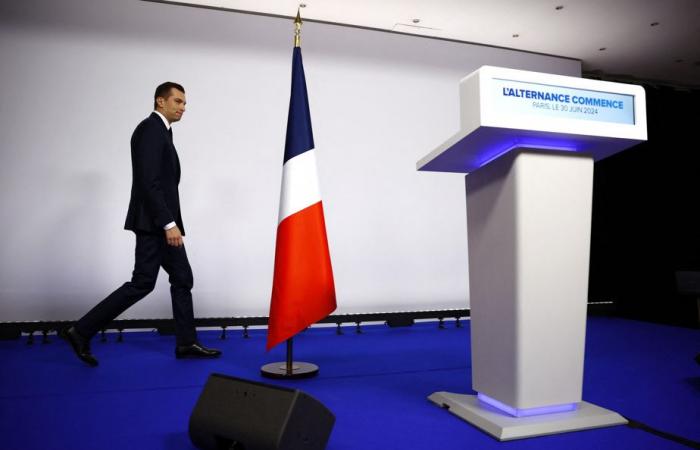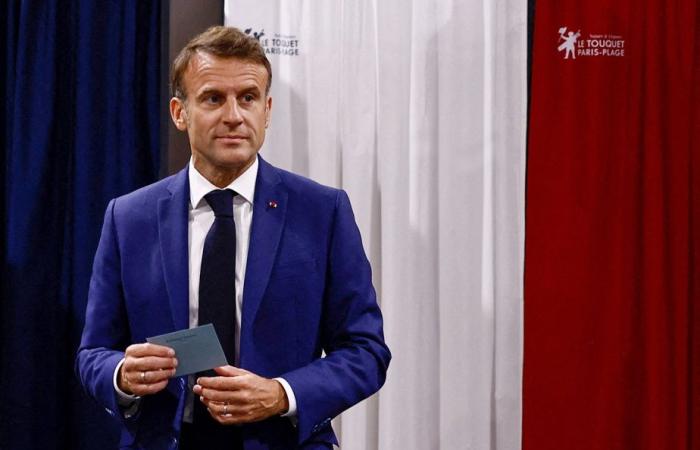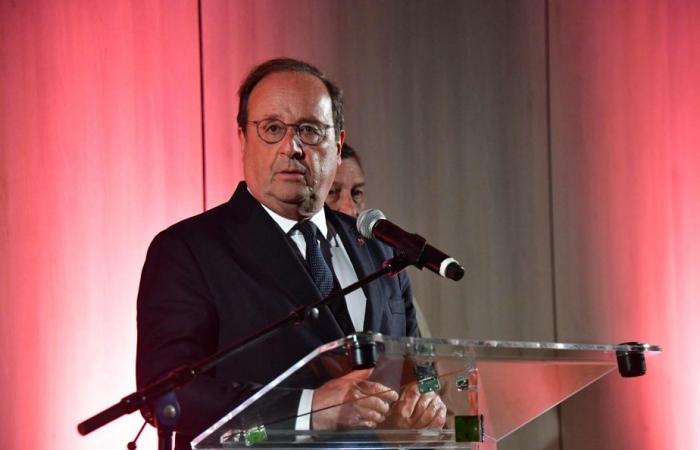(Paris) The National Rally came out on top on Sunday in the first round of historic legislative elections and asked the French to give it an absolute majority in the second round that could bring the far right to power for the first time since World War II.
Published at 10:17 a.m.
Updated at 2:42 p.m.
Francesco FONTEMAGGI and Antoine MAIGNAN, with the provincial offices and the political service of the AFP
France Media Agency
While debates are already underway on the formation and extent of a “republican front” to block it, the party of Jordan Bardella and Marine Le Pen is able to obtain a strong relative majority or even an absolute majority. next Sunday.
But the scenario of a blocked National Assembly, with no possible majority alliances between the three blocs present, also remains a possibility.
With 33.5-34% of the vote, the RN and its allies obtained their best score in the first round of a vote, improving that already record for the European elections, according to estimates from the Ipsos and Ifop institutes. They are ahead of the New Popular Front bringing together the left, which obtains 28.1-29.1%, far ahead of Emmanuel Macron’s camp at 20.7-22.1%, during this vote marked by a sharp increase in participation. .
The Republicans (LR) who have not formed an alliance with the RN are around 10%.
“We need an absolute majority,” launched Marine Le Pen, announcing her own election as deputy in the first round in her stronghold of Hénin-Beaumont.
PHOTO FRANÇOIS LO PRESTI, AGENCE FRANCE-PRESSE
Marine Le Pen
“Respectful” but “uncompromising”
According to the three-time presidential candidate, “the Macronist bloc” is “practically erased” after this first Sunday of early voting caused by the surprise dissolution of the Assembly.
Smooth face embodying a demonized Lepenist party, Jordan Bardella, who aspires to enter Matignon at only 28 years old, promised to be “a prime minister of cohabitation, respectful of the Constitution and the function of the President of the Republic, but intransigent » on his government project.
This would be an unprecedented cohabitation between Emmanuel Macron, a pro-European president, and a government much more hostile to the European Union, which could cause sparks to fly over the prerogatives of the two heads of the executive, particularly in matters of diplomacy and defense.
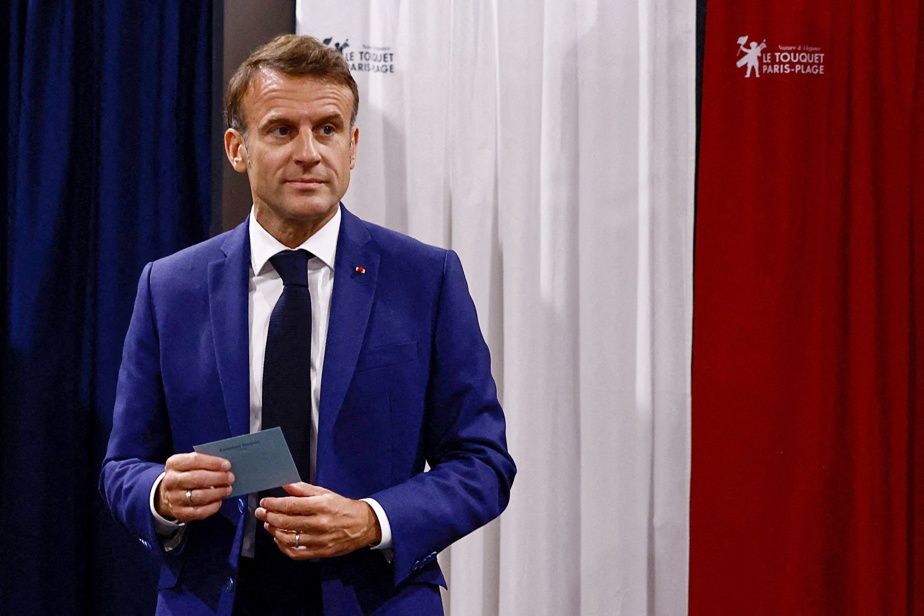
PHOTO YARA NARDI, AGENCE FRANCE-PRESSE
French President Emmanuel Macron
The outcome of the second round will largely depend on withdrawals and voting instructions in each constituency. Before these crucial decisions, a record number of potential triangulars is expected, potentially affecting some 300 of the 577 parliamentary seats at stake.
“Faced with the National Rally, the time has come for a broad, clearly democratic and republican gathering for the second round,” Emmanuel Macron affirmed in a written statement sent to the media at 8 p.m.
“Ni-ni”
At the Élysée, as with most of the leading figures in his camp, this gathering seems likely to exclude the candidates of La France Insoumise, or a certain number of them.
His former Prime Minister Édouard Philippe thus considered that “no vote” should “be cast for the candidates of the National Rally or those of France Insoumise”. A few Macronist voices, including those of Minister Roland Lescure, were nevertheless raised to “block the extreme right” including, if necessary, by voting for an LFI candidate.
On the left, several leaders have again called for their troops to withdraw if another candidate is better placed against the RN.
After maintaining a certain vagueness, Jean-Luc Mélenchon, the leader of La France insoumise, announced that his candidates would withdraw if they finished third and the RN was in the lead.
PHOTO DIMITAR DILKOFF, AGENCE FRANCE-PRESSE
Jean-Luc Mélenchon
“It would be incomprehensible if some continue not to differentiate between the left and the extreme right,” reacted the boss of the Ecologists Marine Tondelier, calling for the “construction of a new republican front”, despite its continued decline in the over the years.
LR for its part refused to give voting instructions for the second.
The dissolution announced by the head of state on the evening of the rout of his candidates in the European elections of June 9 should, in any case, profoundly shake up the political landscape.
Another key ally of Emmanuel Macron, the leader of the MoDem François Bayrou said he regretted a “sanction vote” which represents a “threat” at the end of a vote marked by strong distrust, even a rejection of the president.
Faure re-elected, Roussel defeated
According to Ipsos, there could be between 65 and 85 elected representatives in the first round. Among them, the RN deputy of the North Sébastien Chenu and the leader of the socialists Olivier Faure in Seine-et-Marne.
Other personalities were eliminated without waiting for the ballot, including the communist leader Fabien Roussel, or the former socialist minister Jérôme Cahuzac who had attempted a return to politics despite his conviction for tax fraud.
Several figures from national politics have thrown themselves into the battle, such as former President François Hollande in Corrèze (leading in the first round with 37.7%) or one of the leading figures of the right, Laurent Wauquiez (leading in his constituency of Haute-Loire).
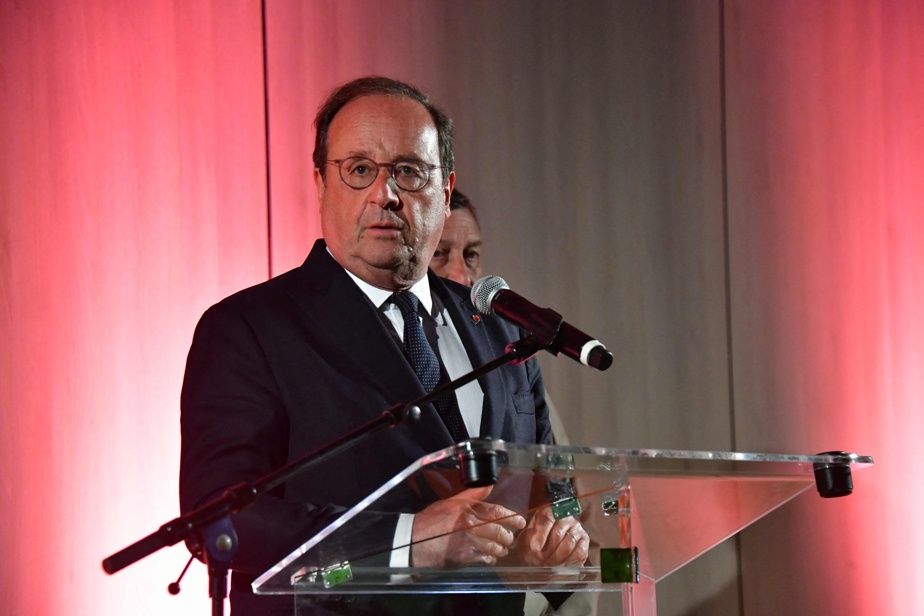
PHOTO PASCAL LACHENAUD, AGENCE FRANCE-PRESSE
Francois Hollande
Among the ministers, Gérald Darmanin is in the lead in Nord ahead of the RN. The former head of government Élisabeth Borne is second behind the far-right party, in Calvados.
The left managed to overcome differences that could seem irreconcilable to unite in the wake of the dissolution, despite disagreements between LFI and its partners which parasitized its campaign, in particular over the contested leadership of Jean-Luc Mélenchon.
Meanwhile, nothing seemed to slow down the RN’s momentum in the campaign on purchasing power and against immigration: neither the vagueness over the repeal of Emmanuel Macron’s pension reform nor the controversies over dual nationals, or the sulphurous remarks of certain far-right candidates.
Participation should be at least 65% of registered voters, according to polling institutes. This is well above the 47.51% of 2022, but below the 67.9% of the last legislative elections organized after a dissolution, in 1997.
“Finding serenity”
Overseas, outgoing deputies from the centrist Liot group or invested by the NFP are in the lead in Guadeloupe and Guyana. In Polynesia, the autonomist candidate Moerani Frébault was elected in the first round.
In the polling stations, many voters expressed their excitement for these early elections during the day.
“I would like to find some peace because since the European elections, everything has taken on a worrying scale. But we must continue to fight for what we believe in,” Roxane Lebrun, 40, told AFP in Bordeaux. In Saint-Étienne, Christophe, a 22-year-old police officer, was worried about a vote that could “divide the population even more.”
In Rennes as in Lyon, many stores in the city center protected their windows for fear of excesses after the announcement of the results.

